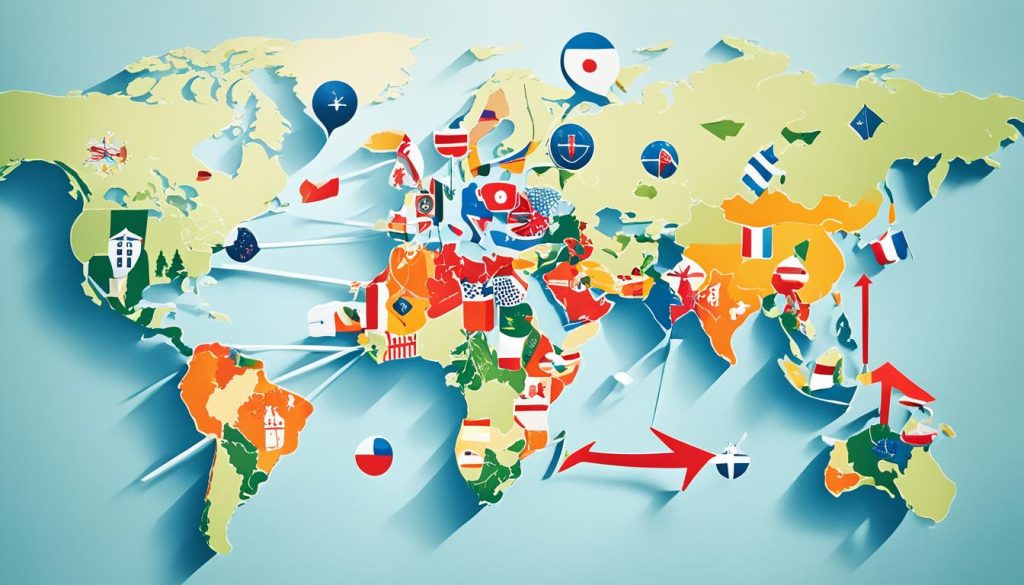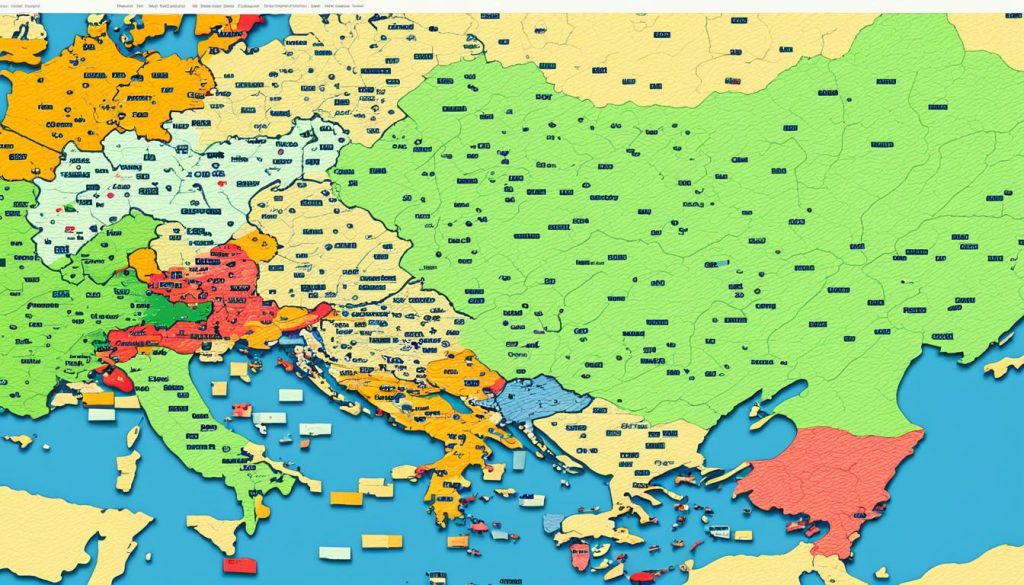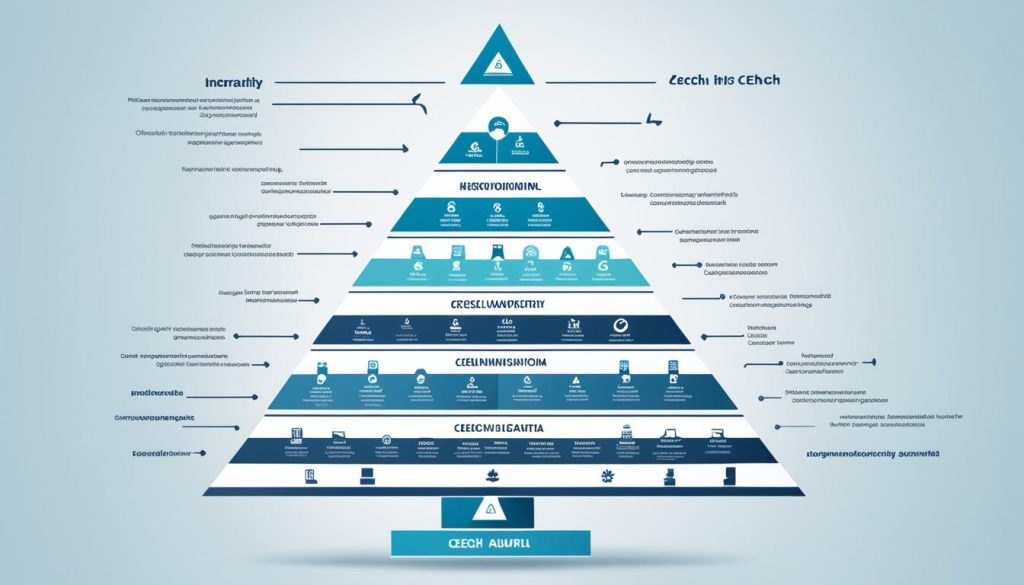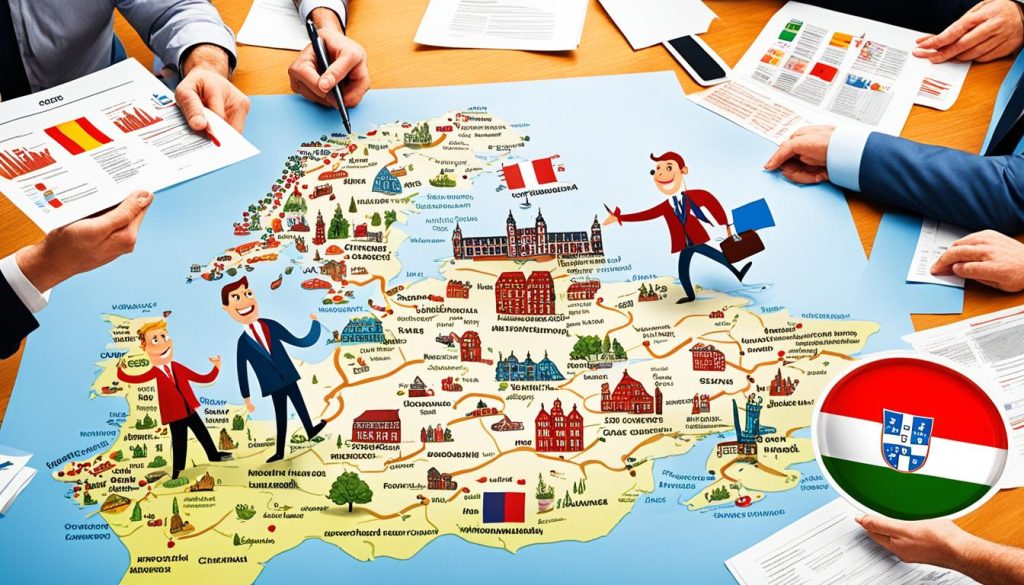Understanding different business practices and cultures is key in international business. When looking at Portugal, the Czech Republic, and the Netherlands, each country has its own way of doing business. Knowing these can help you work better in these markets.
It’s also vital to follow international business etiquette, respectful of each country’s culture. This leads to strong business relationships. It allows you to connect with people from diverse places.
Introduction: The Intersection of Business and Culture
In today’s world, businesses and culture blend together, offering exciting opportunities and challenges. Understanding cultural intelligence is key. It lets professionals work well with people from other countries. This builds strong global networks.
Companies in Portugal, the Czech Republic, and the Netherlands must grasp these cultural differences for success. So, it’s vital to weave cultural intelligence into international business plans.
- Cultural intelligence is crucial for understanding global markets.
- It helps companies welcome diversity, improve communication, and stay ahead.
- It also shapes product development, marketing, and how we connect with customers.
Using cultural intelligence helps decode negotiation styles and tailor approaches to local markets. It ensures products reflect the values and needs of different regions. This way, businesses can turn cultural gaps into pathways for success.
As the world’s economy gets more linked, cultural intelligence becomes more important. It shapes a flexible international business strategy. This view sees global markets as diverse cultures, filled with unique chances for the ready.
The Economic Landscapes of Portugal, Czech Republic, and Netherlands
Looking into Portugal, the Czech Republic, and the Netherlands shows they are different in their economic paths. They have their own challenges and opportunities. Their financial growth and economic drivers are unique to each country.
Comparing GDP and Economic Growth
If we look at the GDP growth of these three countries, we can see how strong their economies are. Their economic indicators show they are at different stages of financial growth. This makes them attractive for different types of investments in Europe.
Key Industries and Trade Relations
- Portugal’s robust tourism sector
- The Czech Republic’s advanced manufacturing and automotive industry
- The Netherlands’ prowess in logistics and international trade
The leading industries in these countries boost their GDP. They play significant roles in the world economy. Different sectors help them grow businesses and work together globally.
Workforce Education and Skill Levels
The education systems in Portugal, the Czech Republic, and the Netherlands help in creating a skilled workforce. This is supported by vocational training and higher education. These skills are crucial. They help improve the economy and make these countries fit for the global business competition.
In conclusion, Portugal, the Czech Republic, and the Netherlands have their different economic strengths and education systems. But each uses these to keep growing financially and improving their GDP.
Corporate Cultural Norms in Eastern Europe
Exploring different business cultures is crucial when entering new markets. Specifically, the Czech Republic is unique in defining its corporate identity. This is true compared to other Eastern European countries.
While business etiquette in Eastern Europe shares common features, like being on time, differences in hierarchy and negotiation styles are significant. Understanding these differences is essential for successful international partnerships.
- Greetings and Initial Meetings: A firm handshake and direct eye contact are the hallmarks of first encounters in the Czech business environment, reflecting a shared aspect of business etiquette across Eastern Europe.
- Punctuality: Time is highly valued, and punctuality is a sign of respect. Czech businesses along with their Eastern European counterparts, take deadlines and meeting times seriously.
- Business Meetings: Particularly in the Czech Republic, meetings are expected to adhere to a formal agenda, highlighting a structured approach to corporate interaction.
- Negotiations: A characteristic trait of the Czech corporate style is the favouring of methodical and well-prepared negotiations, a preference that can be situated in the larger Eastern European business norm of valuing thorough analyses and detailed propositions.
- Business Cards: The exchange of business cards is a ritual that holds significant importance, and it is advisable to treat this exchange with a degree of ceremony indicative of the person’s position.
- Formality in Communication: Both the Czech Republic and its neighbouring countries maintain a level of formality in business communications, reflecting deference to positions and roles within the corporate hierarchy.
Knowing these cultural standards is key to a good business environment. By understanding the differences and similarities between the Czech Republic and its neighbours, you can build successful international relationships.
Business Etiquette in Portugal
Knowing how to act in Portuguese business settings is crucial to build great work relationships. It helps make sure everyone works well together. Getting to know local ways and rules can really help you succeed in business deals and talks.
Business Meeting Protocols
In Portugal, being on time shows you’re a pro. When you meet someone, a strong handshake and looking them in the eye is key. It helps start things off right. You should use titles unless told otherwise, to show respect.
Plan your meetings ahead and confirm them to show you’re organised. Sharing an agenda early shows you’re open and helps everyone prepare.
Importance of Relationships and Networking
Building trust and getting to know people is at the heart of doing business in Portugal. It’s more than just swapping contacts. You need to spend time with others to make strong professional bonds.
- Having long lunches is a good way to mix personal chats with work talk. This can strengthen work relationships.
- Going to local events and meet-ups is great for meeting new people. It can really help you get known in the market.
Negotiation Styles and Decision Making
Portuguese meetings favor careful talk and listening well. Quick decisions are rare. Instead, they take time to think things over. Usually, the big bosses make the final decisions. This shows how they prefer secure and steady business moves.
- They like to get many viewpoints before deciding. This makes sure they’ve thought of everything.
- Remember to respect their business culture during negotiations. Honouring their hierarchy and methods is key for good results.
The Role of Hierarchical Structures in Czech Business Practices
Understanding Czech corporate hierarchy is key for business success in the country. Knowing the levels of authority in Czech companies helps when dealing with local businesses. Respect for hierarchy is essential in the Czech corporate world.
In the Czech Republic, business decisions come from the top. This reflects the clear authority levels. It affects both how companies work internally and how they deal with others, with leaders driving major decisions.
- Directors and senior executives are crucial in decision-making and set the company’s direction.
- Middle management ensures that the company’s goals are spread across and followed by everyone.
- Employees follow orders, helping achieve the company’s aims while respecting the hierarchy.
Being thorough in meeting preparations is common. This includes detailed presentations and careful planning. Czech business management is all about clear roles and meeting expectations. Adapting strategies to this can greatly help in succeeding with Czech firms.
To sum up, fitting in with Czech business practices means understanding their valued hierarchy. Every level, from the top to the bottom, has its own role. Knowing this is crucial for anyone wanting to do well in Czech business.
Dutch Business Culture: A Blend of Formality and Pragmatism
The Netherlands is famous for its canals and tulip fields. But, it also has a unique business culture. It mixes formality with pragmatism. This mix helps create a successful commercial setting. Global business leaders admire it.
This culture is all about solving problems and being committed to innovation. It makes the Netherlands a key player on the world stage.
Approach to Problem-Solving and Innovation
Dutch innovation starts with a strong problem-solving mindset. They face challenges head-on, often in creative ways. This is central to the Netherlands’ business culture. It’s why they lead in areas like water management, renewable energy, and tech.
Their approach includes being open to new ideas. They also believe trying new things is essential for progress. This makes them agile in solving complex problems.
Attitudes Towards Work-Life Balance
The Dutch value happiness at work a lot. It creates a dynamic and creative workforce. They think having a good work-life balance is key for lasting success.
Workers in the Netherlands enjoy flexible schedules and part-time opportunities. There’s also generous leave. These practices show the Netherlands cares for its workers’ well-being. This leads to a happy and innovative team.
- Advocacy for employee well-being.
- Implementation of flexible work policies.
- Encouragement of professional and personal life equilibrium.
Comparing Business Communication Styles
In the world of global business, the way people communicate differs widely. A look at different countries shows how negotiation tactics and intercultural dialogue affect outcomes. This piece dives into how these communication styles impact business across borders. It focuses on the Czech Republic, Netherlands, and Portugal.
Directness and Indirectness in Negotiations
Negotiation styles vary, especially in being direct. Dutch professionals are known for clear, straight talk in business. They value being to the point. In contrast, Czech business talks are more subtle. Negotiation tactics must adapt to each culture. This improves cross-border dealings and encourages intercultural dialogue.
Adjusting to different communication styles is vital for success. It helps avoid misunderstandings. And it builds strong, lasting partnerships.
Use of English as a Business Language
English connects people in global business. It serves as a common language, easing communication across nations. Portugal, the Czech Republic, and the Netherlands all use English in business. It simplifies talks and teamwork.
Understanding these communication differences and using English helps businesses thrive globally. It’s as important as traditional strategies for international success.
Understanding Cultural Sensitivities and Taboos
Knowing about cultural awareness is key in international business. Not knowing cultural customs where you work can lead to big mistakes. It’s essential to grasp cultural norms and avoid taboos to succeed.
Respect is crucial. This means understanding traditions and showing the right manners at meetings. This shows respect for the host country’s culture.
- In places like Japan or Korea, when you exchange business cards, do it with both hands. This shows respect.
- In the Middle East, don’t show the soles of your shoes. It’s seen as rude. Always be mindful of how you sit.
- Direct eye contact means different things around the world. While in the West it shows confidence, in many Asian cultures it could be seen as rude.
Being adaptable and culturally smart is vital. By respecting cultural customs, you can succeed in global markets. You’ll also build strong, respectful relationships.
Social Media and Digital Presence in Business Strategies
In today’s digital age, having a strong online presence is key for businesses. Many are turning to social media and other digital strategies to stand out in a crowded market. In places like the Netherlands, companies quickly adopt these modern ways to connect with people. Eastern European countries are starting to catch up, using these tools more in their marketing plans.
Adoption of Social Media in Marketing
For businesses, adapting to social media marketing is crucial for growth. It blends into their marketing mix, improving brand visibility. This approach helps build direct connections with their customers. Engaging campaigns and lively content are now essential. They encourage stronger customer bonds and loyalty to the brand.
Impact of Digitalisation on Business Expansion
Digitalisation is opening new paths for businesses to grow online. It allows them to overcome old limits easily. With digital strategies, companies navigate competitive markets more effectively. Adding technology into their core activities boosts growth. This helps them to be present everywhere online, a must-have in our global world.
Identifying Challenges for SMEs in Divergent Markets
Small and medium-sized enterprises (SMEs) in Europe face many challenges. They deal with SME challenges like market entry barriers. These barriers make business development tough. SMEs need to be alert and flexible to succeed in these varied markets.
SMEs struggle to understand and adapt to different cultures and business practices. These vary widely across countries. Every area has its own rules and expectations. Ignoring these can lead to misunderstandings or distrust.
To overcome these, SMEs should consider several key actions:
- Gaining a deep understanding of local customs to avoid cultural conflicts during negotiations.
- Creating a strong, adaptable business plan that fits the financial and legal environment.
- Building solid partnerships to ease market entry and gather local insights.
- Analysing the market thoroughly to spot demands and unexplored niches.
- Tailoring products or services to the local customers’ unique tastes and needs.
Also, market entry barriers include economic policies and regulations. These barriers need smart planning. Challenges like taxation and employment laws require SMEs to get expert advice. This advice helps align with local laws.
- Carrying out detailed risk assessments to identify legal and compliance challenges.
- Working with local authorities for guidance on regulations.
- Hiring local experts familiar with the country’s legal system.
In summary, SME growth and business development in Europe is full of chances. Yet, companies must tackle these challenges with smart planning and flexibility. SMEs are key to economic growth. Their success benefits everyone in the market.
Workplace Attitudes and Management Styles
From Portugal’s quaint alleys to the Czech Republic’s busy streets, and the pragmatic Netherlands, management styles deeply influence employee drive and engagement. Different countries show unique management styles. These reflect their cultural backgrounds and corporate strategies.
Motivational Techniques and Employee Relations
It’s vital to understand how cultures differ in managing employees. What works in Amsterdam may not in Brno or Lisbon. Thus, leaders must adjust to what motivates their international teams.
- Intrinsic versus extrinsic rewards and how they are perceived by employees.
- Recognition programmes adapted to align with local values and expectations.
- Development opportunities that cater to the skill aspirations of the workforce.
To create a positive workplace, these factors are key. They help boost worker involvement. This leads to an organisation’s success.
Leadership Preferences Across Cultures
Leadership styles range from egalitarian to authoritative. This affects company dynamics. In the Netherlands, decentralised leadership allows more employee freedom. Czech firms, however, may prefer centralised decision-making.
- Impact of cultural values on leadership style preferences.
- The role of employee participation in decision-making processes.
- Approaches to conflict resolution and maintaining authority within the workplace.
Adapting to cultural differences in management can improve motivation tactics. It solidifies employee engagement as key to success.
Analysis of Student Placement Support in Business Ecosystems
Offering strong internship support is key in preparing future workers in Eastern Europe. In places like the Czech Republic, companies see the win-win in setting up educational partnerships. These provide real work experience through detailed vocational training programs. Learning real business skills along with school theory is crucial. It gets students ready for the workforce as versatile, skilled professionals.
Yet, growing such programs takes deep study. We need to grasp the current scene and spot chances for betterment. The three main focuses for effective student placement are integration, support, and progression. Paying close attention to these can help link education with the needs of industries.
- Integration: Urging more firms to get involved in education, improving apprenticeships for an easier shift to working life.
- Support: Offering help and advice to help students grow and build confidence, ensuring a fair exchange with businesses.
- Progression: Creating clear paths for interns to move into permanent jobs, focusing on career growth and learning more skills.
- Analyse how effective internship support is in Eastern Europe’s companies.
- Talk about the range of educational partnerships and their effects on students and companies.
- Look into new ways for vocational training that meet changing industry needs.
The two-way link between schools and companies, powered by internship support, boosts opportunities for students and helps businesses grow. Moreover, educational partnerships are key for sharing knowledge, sparking innovation, and building a skilled workforce. Putting a strong emphasis on quality vocational training is vital. It helps in standing out in the global job market.
Religious and Cultural Diversity Influence on Business
The global business scene is like a tapestry. It mixes religious diversity and cultural impact on business. This mix creates a society that values many different things. In the Czech Republic, there’s a blend of Catholic and Protestant traditions. This mix affects how businesses work and how people interact.
To work well with different cultures and religions, we need more than tolerance. We must have inclusive policies. These policies help everyone feel respected for who they are. This makes workplaces better because they use cultural insights to make decisions and innovate.
- Integration of religious holidays and observance accommodations in scheduling.
- Recognition of dietary restrictions and the provision of suitable options at business events.
- Promotion of open dialogue and educational sessions on cultural competencies.
Businesses that include everyone do better. They are more innovative and flexible. These companies have happier staff, reach more customers, and are seen as good in society. This approach is key for long-term success.
- Assessment of corporate culture to ensure alignment with diverse religious practices.
- Transformation of leadership development programs to encompass diversity training.
- Implementation of a global diversity charter or equivalent frameworks.
Ignoring our world’s diversity is a big mistake. It means missing out on chances to grow and create new ideas. As firms grow globally, the mix of different cultures, religious diversity, and cultural impact on business, along with inclusive policies, is crucial.
Comparing Competitive Edge in International Rankings
Countries fight for recognition on the world economic stage. Benchmarks like the World Competitiveness Ranking are key. They show not just how economies perform but also how nations manage their strengths. These insights reveal the differences among market players. They guide the goals and plans of both governments and businesses.
The IMD World Competitiveness Ranking Insights
The IMD World Competitiveness Ranking examines how nations maintain their competitive edge. Take the Netherlands, for example. It excels due to excellent infrastructure, open trade, and an innovation focus. These factors push it to the forefront. This ranking highlights how effective leadership boosts a nation’s global competitiveness.
How Rankings Reflect Business Health and Innovativeness
Global rankings spotlight the state of a nation’s business environment and innovation levels. They offer insights into how countries like Portugal, the Czech Republic, and the Netherlands promote business and economic growth. High ranks point to a mix of entrepreneurship, progressive policies, and a flexible workforce. These are vital for long-term success and standing out in the global market.
Conclusion
Looking back, exploring business in Portugal, the Czech Republic, and the Netherlands shows how complex cross-cultural business can be. Understanding both the market and strategic planning is key in these different European countries. Lisbon buzzes with energy, Prague focuses on precision, and Amsterdam leads with innovation. Each place shows its own blend of economy, culture, and rules.
The world of business is not just about numbers and deals. It’s also about people and cultures. International insights do more than find growth opportunities. They show us how local business manners and consumer actions work. For example, the Netherlands favours openness and efficiency. In contrast, Portugal values relationships, and the Czech Republic respects hierarchy in business culture.
Success in these markets comes from respecting local ways and being innovative. Planning must consider cultural differences to build strong international relationships. Respecting and understanding each country’s business style are crucial. They are the foundation for lasting connections in the global business scene.
















